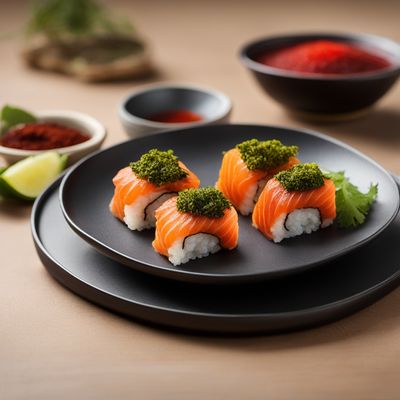
Ingredient
Yesso scallop
The Ocean's Delicacy
Yesso scallops are characterized by their large, fan-shaped shells and tender, creamy-white meat. With a delicate and slightly sweet flavor, they offer a buttery and melt-in-your-mouth texture. These scallops are often pan-seared, grilled, or used in stir-fries to showcase their natural sweetness and tender texture.
Origins and history
Yesso scallops are native to the cold waters of the northwest Pacific Ocean, particularly in the Sea of Japan. They have been a staple in Asian cuisines for centuries, with Japan being one of the largest producers and consumers of these delectable mollusks. Yesso scallops have a rich history in Japanese culinary traditions and are highly regarded for their quality and taste.
Nutritional information
Yesso scallops are a good source of protein, low in fat, and rich in essential minerals such as magnesium, zinc, and selenium. They are also a good source of vitamin B12, which is important for nerve function and red blood cell production.
Allergens
Yesso scallops may contain shellfish allergens and should be avoided by individuals with shellfish allergies.
How to select
When selecting Yesso scallops, look for plump and firm meats with a creamy-white color. Avoid scallops that appear dull, discolored, or have a strong fishy odor. Fresh scallops should have a slightly sweet aroma of the sea.
Storage recommendations
To maintain the freshness of Yesso scallops, store them in a sealed container or bag in the coldest part of your refrigerator. They are best consumed within 1-2 days of purchase, as their quality deteriorates quickly.
How to produce
Yesso scallops are typically harvested from the wild, but they can also be cultivated in aquaculture farms. Cultivating scallops requires specialized equipment and knowledge, making it more suitable for commercial production rather than home cultivation.
Preparation tips
Yesso scallops can be enjoyed in various ways, such as pan-searing them with butter and garlic, grilling them on skewers, or adding them to seafood pasta dishes. They are also delicious when used in stir-fries or as a topping for sushi and sashimi. Remember to cook them briefly to preserve their tender texture and delicate flavor.
Substitutions
Bay scallops or sea scallops can be used as substitutes for Yesso scallops, although they may have slightly different flavor profiles and textures. Bay scallops are smaller and sweeter, while sea scallops are larger and meatier.
Culinary uses
Yesso scallops are commonly used in Japanese cuisine, particularly in dishes like scallop sashimi, scallop nigiri sushi, and scallop hot pot. They are also popular in Chinese and Korean cuisines, where they are often stir-fried with vegetables or added to soups and stews.
Availability
Yesso scallops are primarily harvested in Japan, Russia, and South Korea. They are also available in some Asian markets and specialty seafood stores around the world.
More ingredients from this category

Scallop, sea
The Jewel of the Ocean

Scallop, bay
The Ocean's Delicacy

Scallop, new zealand
The Ocean's Delicacy: Discovering the Flavors of New Zealand Scallops

Scallop, great
Oceanic Delicacy: Discovering the Great Scallop

Scallop, queen
The Regal Delicacy of Queen Scallops

Scallop, giant pacific
The Ocean's Delicacy: Unveiling the Majesty of Giant Pacific Scallops

Scallop, australian
Ocean Gems: Discover the Exquisite Australian Scallops
Recipes using Yesso scallop

Hotate Nigiri Sushi
Ocean Delight Nigiri Sushi

Haute Kaiseki: A Fusion of Japanese Elegance and Haute Cuisine Sophistication
Elevated Umami: A Haute Kaiseki Journey through Japanese Culinary Artistry

Katuk Stir-Fry with Tofu and Shrimp
Indonesian Delight: Katuk Stir-Fry with Tofu and Shrimp

Pakistani-style Spiced Scallop Nigiri Sushi
Savor the Fusion: Pakistani Spiced Scallop Nigiri Sushi